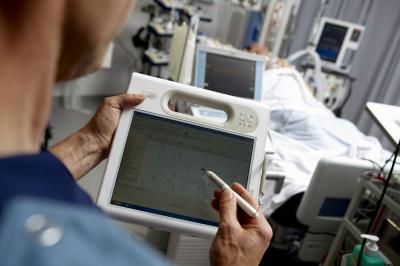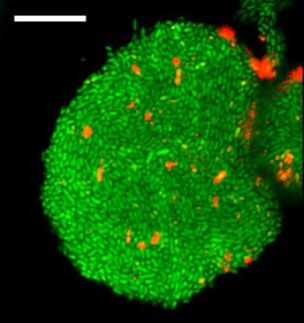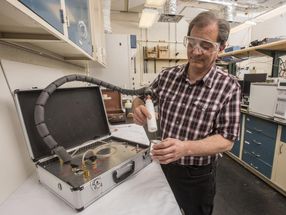Intelligent use of electronic data helps the medicine go down
New study shows how 'technovigilance' can help to save lives in hospitals
Electronic data routinely gathered in hospitals can be used as a warning system for missed doses of prescribed medicine and making improvements to patient safety, says a new study.

This image shows an electronic prescribing and decision support system.
University of Leicester
A team from the Universities of Leicester and Birmingham found that the secondary use of data from an electronic prescribing and decision support system in an English hospital led to a 'substantial and sustained' reduction in rates of missed or delayed doses of medicines.
Published in the journal Milbank Quarterly, the study looked at how using the electronic system combined with organisational efforts helped to address a major patient safety threat.
Roughly one in five patients in NHS hospitals miss a dose of prescribed medication or get it late. The National Patient Safety Agency has shown that omitted or delayed doses of essential drugs are a major problem, responsible for 27 deaths, 68 severe injuries and 21,283 patient safety incidents between 2006 and 2009 in the UK. But effective solutions for monitoring and reducing the problem have been hard to find.
The electronic system in the study hospital could be programmed to trigger a series of emails if, for example, a patient missed more than two doses of antibiotics. If no action was taken, these emails was be escalated upward, from ward nurse through the layers of the hospital, eventually to chief executive.
Professor Mary Dixon-Woods, Professor of Medical Sociology at the University of Leicester Department of Health Sciences, says: "This is one element of what we call 'technovigilance' – turning data into intelligence which can then be put into effective action. Other elements include using the electronic system to find examples of where care did not seem to meet the required standards, and holding high-level care omissions meetings with staff on clinical areas to find out what happened".
'Technovigilance' was credited with a fall in the rate of missed doses from 12% to 5%.
Dr Jamie Coleman of the University of Birmingham commented that: "Data generated by the system is used to make formerly hard-to-detect practices, behaviours and performance more transparent. This means necessary preventative action can be taken more easily."
The study found that these preventative actions included fixing organisational systems – such as delivery of medicines to specific locations – as well as emphasising the personal responsibility of individual staff. The hospital's executive team credited technovigilance with a major "cultural shift" in staff attitudes towards administering medicines on time.
In an accompanying editorial, Professor David Bates of Harvard University comments that, "Such data can have a powerful effect on improvement. But in the rush to computerize, tools like this are not yet a routine component of most electronic health records. The overall implication is that all hospitals will need tools like this, and soon."
But technovigilance was not without its unintended consequences.
Dr Coleman says: "Technovigilance is intentionally used as a way of ensuring that individuals know their behaviour is being monitored and that they will be open to scrutiny. Although it's not strictly intended to be punitive, being called to a care omissions meeting, for instance, could be a very uncomfortable experience for staff."
Other unintended consequences found in the study included the risk that staff focused on the things being measured at the expense of other less measurable but important activities, or 'gaming', where staff may try to create the appearance of better performance.
Professor Dixon-Woods commented: "One danger was that staff were so busy doing things that were going to be electronically monitored by the system that they did not have time to do other equally valuable things – such as talking to patients. We also identified concerns that the way the system was set up meant that nurses' behaviour was subject to much more surveillance than others."
The model of technovigilance is now being optimised in light of findings from the study. The researchers stress that using alternative and complementary forms of intelligence, including evidence of patients' experience and executive visits to clinical areas, may be important in countering the distorting effects of technovigilance and allowing a more complete picture of the quality and safety of patient care to emerge.






















































